Dear Esther revealed: an indie Source Engine game
"Grief, loss, guilt, faith, illness... But it's also about love and hope and redemption" That's how Dear Esther's designer describes his game.
Imagine a Source Engine title without any guns or physics puzzles. Dear Esther emerged from a research question proposed by Dr Dan Pinchbeck in Portsmouth University: "What would happen if a game was to focus purely on storytelling, to the exclusion of more traditional interactive elements? The project has gone from humble mod to commercial release on Steam, redesigned by one of the team behind the stark environments of Mirror's Edge. It's got potential to change how you think about games forever.
Issue 224 of PC Gamer UK has an in-depth feature on innovative title, but we like you so much that we're giving away our interviews with the designer, developer and sound designer for free. Click more to get the scoop.
Dr. Dan Pinchbeck - Designer
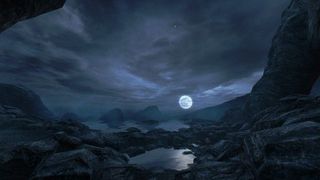
How has Dear Esther come to be heading for a commercial release?
I was harassing Rob about going for a [Source Engine commercial] license a while back and we kind of agreed to hold off on the discussion until it was a bit more together. Then after the update on 30th June, Rob pitched the idea to the community and we got very positive responses, so we started talking to Valve after that.
So my reasoning behind it was that Rob was creating something so extraordinary with the remake, it deserved a wider audience than we could give it as a mod. I love the mod scene, but it is limited in terms of reach, and I also knew quite a few people who really wanted Esther but for a bunch of reasons either didn't want Half Life 2, or weren't exactly technical in terms of mucking about with SourceMod folders and all that. And I also knew if we went to indie, I could leverage some funds to rebuild all the audio, which I was keen to do. It was always really, really strong, but I just thought with Rob's work, it deserved a facelift too.
Underlying this is my wider research agenda. I think games researchers and academics have this amazing opportunity to explore high-risk areas of game design and development, and we have almost an obligation to run with ideas and push them as far as we can. Commercialising Dear Esther just extends that, so we started off saying 'will this kind of thing work as a game?', and the answer was pretty resolutely 'yes', so the next question is 'what happens if you commercialise that?'. And if that works, then it means we are generating income we can use to underwrite the next experiment, and we're moving towards sustainable, practice-led research in games. Which is massive - it's a completely new thing for the UK. We're doing something that has actual, absolute relevance to industry, and we're proving it has value, not in some obscure journal, but out there, in the marketplace.
PC Gamer Newsletter
Sign up to get the best content of the week, and great gaming deals, as picked by the editors.
Dear Esther is an unusual concept. How did the idea come about originally?
So Esther is basically about ambiguity in game stories. It came from this idea that you could do more with storytelling in games if you stopped worrying about everything making sense and adding up, and that when you read a book or watch a film, you are filling in a lot of those details yourself. Games are like films in that regard - you have these cardboard cutout sets and no-one worries about that, we focus on the front, not the back. So we can apply a similar thing to story, and stop giving as much away.
And I'm really interested in stuff like William Burroughs and the Strugatsky brothers, and was reading a lot of big, dark romantic poetry, and listening to a lot of quite odd but very beautiful music and wanted to make a game story like that. So it's all about the feel, the flow, the mood and actually it's full of holes and contradictions and abstract ideas and symbols, and you don't even understand a load of it, but it somehow all still hangs together and creates a really extraordinary experience. And I wanted to know if you could do that in a game, but a game that had quite a traditional voice-over approach to story. Because I'm a writer, I love text and words, and didn't want to go fully down the Ueda route, but was trying to fuse that kind of sense with a more traditional approach to how you deliver story in a game. Which also relates to what kinds of stories you can tell, and how, and the range of those stories in terms of emotional, mood, character.
I guess the driving force behind it was, on a structural level, that games offer an unprecedented and totally unique space to explore what stories can be... and then on a more content level, this attempt to tell a completely different type and style of story than had been attempted in a game before.
How did Rob's remake come about?
He wrote to me out of the blue and asked if I had a problem with him remaking it. So I looked at his portfolio and wasn't about to argue - the fact he was on the Mirror's Edge team, which is one of the most beautiful games of recent years helped too! I think he's an exceptional talent and I feel really lucky and proud to have made something that someone of Rob's ability was into enough to want to spent a year of his life working on.
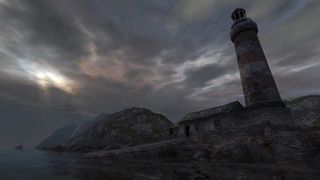
What do you think he's added to the Dear Esther experience? Obviously it's prettier, but what about more fundamentally?
There's a lot of subtle stuff going on in there, and what's really cool is how he's responded to the original version and put his own spin on stuff, rather than just carbon-copying it. I sent him pages of random notes and a descriptive walkthrough of what I thought I was probably trying to get at for each VO trigger, and then I've been looking at the alphas and feeding back, but right up until the deal with Valve happened, it was mainly Rob's gig.
Since then, I've been working with Jess on the new soundtrack, writing and recording some new VOs with Nigel and working with Rob on some new features and things in the landscape.
It's going to be quite different in a few ways from the original. The visuals are the most obvious thing, as that's going to have a massive effect on how immersive the island is, and that's really important. There are some new landmarks and fragments of story attached to those; the caves are really quite radically different. If you thought the original soundtrack was good, the new one will take your breath away. And there are some new voice overs to discover that add new depth to the story. There's quite a bit more focus on exploration, properly rewarding the player for leaving the obvious path. And the great thing about going indie with the remake is we've been able to do all of that, to make it more than just a visual overhaul - which to be fair, never really did justice to Rob's amazing work anyway.
The story's obviously a key point. Summarised, and without megaspoilers, what's Esther about?
Grief, loss, guilt, faith, illness. Cheerful stuff. But it's also, and this is really important to me, about love and hope and redemption, and how people cling to each other in the face of a brutal, uncaring world.
Central to the concept of Esther is the idea that there's no central truth, no absolute interpretation of it at all, and it is whatever you take from it. And it's been great how players have really responded to that, there's some amazing versions of it out there.
So on a superficial level, Esther is about a man who finds himself standing on the jetty of a remote Hebridean island. Some time before, he lost someone called Esther, which seems to have driven him here, although he's not sure why. He seems to be following the story and journey of a 18th Century explorer, who was convinced the island had some kind of almost supernatural power, of healing or redemption, some special function in the world. But then it's also about whether any of what is happening is real, whether it's a coma dream, or repressed memory, or fantasy, or a final moment before death, a final release. That might even be giving too much away, but there's also a lot more going on in there. As much as anything else, it's a fog of images and ideas and symbols that can be stitched together in a whole bunch of different ways, depending on how you take them.
It's an extremely tragic. I think we've spoken a little about this before, but do you think there's room to explore more negative emotions in games?
Yeah, although I don't think that's necessarily necessary or a sign of a greater emotional complexity or sophistication. Emo teenage poetry isn't inherently better because it's depressing and self-absorbed. A game that makes you cry is not inherently a more emotionally sophisticated thing than one that captures many subtle shades of joy or rage or fear, all those more traditional game emotions.
But what is important is that we all keep pushing at the potential emotional range of gaming, and how subtle we can make a player's emotional journey. I mean, what I hope about Esther is that although it is fairly dark, there are subtle tones to that, an ebb and flow that makes it an interesting journey that we can all recognise in part, rather than just us standing there hitting the player with the tragedy hammer until they give in. I think there's a really uplifting core to how Esther ends, that last sequence is really all about this sense of release, of wonder. Even marooned in the darkest places, there is hope, humanity.
Having said that, I thought Conscientious Objector - our Doom 3 mod - was funny as hell, but everyone else seems to think it's really depressing and nihilistic, so maybe it's just me.

What is Esther? Is it a game? An "interactive experience"?
I spent a long time agonising over this when we launched it, I think because I didn't think it would be accepted as a game. I was wrong about that, and I'm really happy to be wrong. Esther is an experimental game, unless you want to get really technical about rule-systems and interaction feedback loops and all of that. It looks like a game and plays like a game, so it's a game. Just a very odd one.
But what is acceptable as a game now feels quite different to when we first launched Esther in 2007, which is really weird. So maybe that's the answer. The question of whether it was a game was different in 2007. Back then, I'm not as sure, now, yeah, I think it is.
And how do you see this game space progressing? What state is it in now, and do you think it has potential to go somewhere?
I think we've been in an amazing period of creative expansion in games for a couple of years, and that ranges right from really left-field indie titles to mainstream AAAs. So the space seems to be in a pretty healthy state right now, I'd say. Despite the usual frustrations in terms of content being by-and-large a bit derivative and the usual suspects, there's a fair bit of often quite subtle change in mainstream titles. That's not to say there isn't plenty of room for improvement, but credit where credit is due.
And indie gaming is just fantastic right now, there are so many great titles and developers out there, and some really experimental work, which is finding a place in the market. One of the many things I love about gaming culture is that players are not just happy to pay for innovation, they actively want to. Games get a lot of stick for being derivative and all the same, but the reality is that it's one of the most amazing mediums on the planet in terms of the audience actively demanding experimentation and innovation and being really happy to fund that themselves. So that's really encouraging for me.
In terms of progress and potential, well, I'm slightly more nervous. Up to now, mostly big players have been working in retail, and it's meant that a lot of more niche products got to play online without that kind of competition. If the trend for publishers to move to digital distribution, and developers to self-publish continues, then that means indies may have to compete more with big marketing budgets and that's going to make things tougher potentially. I think it's really interesting how all of a sudden, these really big, established studios are all starting to proclaim their indie roots, or call themselves indies, which is hilarious really. I'd love a deal with EA or Sony, don't get me wrong. But I don't think I'd have the balls to then go around calling myself indie if I got one. What it does show is that the term 'indie' has value, and that's really important, because it's innovation, individual vision, and not being willing to compromise that drives that value. That can only be a good thing.
I'm rambling, as usual. Times have been good, times will get tougher, but games are finding a momentum in terms of innovation, diversity and experimentation, and that's only going to increase. So I think the future is looking good.
Robert Briscoe aka. LittleLostPoly - Developer

How did you come to be remaking Dear Esther?
Back in early 2009, after an exhausting couple of years working in Sweden, I decided to take some time out to recuperate back in the UK and perhaps work on a small project of my own for a while to keep me occupied. Originally I had planned to build upon a small prototype I had been tinkering with for some time called The Willows - a zombie survival horror mod based on the Source Engine. However, shortly before my plans came to fruition, there was a sudden surge of zombie games which eventually led to my decision to put the project on hiatus until the zombie genre was a little less saturated.
This left me with the dilemma of finding an alternative project to work on. I needed something original enough not to have to compete with the mainstream games market, and something simple enough which would allow me to concentrate on my skills as an artist and not be hindered by other limitations such as coding. Struggling with ideas I began trawling through my games collection, and later, through ModDB searching for some kind of inspiration until eventually stumbling across the veritable gold nugget that was Dear Esther.
What appealed to you about it?
It was the inspiration I'd been looking for: a simple, highly original idea which was singularly focused on telling a story through the environment. I found that although the original design and visuals were, quite frankly, a little rough around the edges, it excelled in every other conceivable area. On my first play-through I was completely drawn in, feeling emotions I'd not felt in any game before or since. It stuck in my mind for days afterwards and although I toyed with the idea of translating Dear Esther's core mechanics to my own designs, I couldn't shake the feeling that there was so much untapped potential in the original, if only for a proper coat of paint and a more polished design. I eventually decided to take on the remake and haven't looked back since.
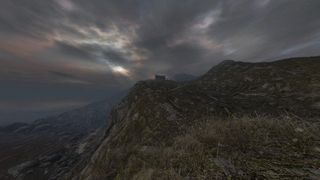
What do you feel you've been able to bring to Esther that the original version didn't capture?
I think one of the areas that the original fell short on was the potential depth of the story that could have been told through the environment. One of the most common complaints about the original was the tediousness of trudging through the simplistic landscape between audio cues and landmarks, which made exploring rather unrewarding, and sought to emphasise the linearity of the game. To be fair, it wasn't really a failing of the design per se, but an shortcoming of the Source Engine and how it handles large outdoor environments. Luckily I had worked with Source for over five years and had a few tricks up my sleeve, which has allowed me to create a much more rich and detailed world than ever attempted before in the Source Engine, which encourages and rewards exploration with the incentive and uncovering small clues and details about the history of the island, its inhabitants and our protagonist.
What is Esther, to you? Is it a game? Something completely different?
That's one question I've been wrestling with for some time now, which makes it especially difficult when trying to explain to your friends and family what exactly it is you've been working on for the past year and a half. I often find myself avoiding the use of the word 'game' in context with Dear Esther, at least in the traditional sense of the word, preferring to describe it as more of an experience or a story. I always ask people if they have ever stared at a painting and wondered what the story was behind it, or imagined being able to transport yourself through that small window into the world and explore it. Most people connect with this, but when forced to revert to a more traditional 'game' context, I will usually fall back to describing it as a first-person adventure game where the goal is to figure out why you're playing it.
What are your thoughts on this sort of "not-game" space at the moment?
I think it's extremely important and highly beneficial to games development as a whole. 'Not-games' tend to focus on, and dissect, important areas which are tragically overlooked in the modern game design philosophy. I believe they allow us a greater understanding and insight into how and why we empathise and interact with our games. Dinner Date, The Graveyard and Every Day The Same Dream are great examples of this.
Jessica Curry - Sound Designer
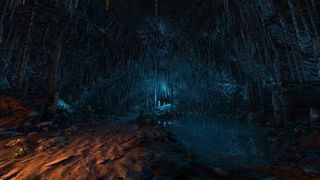
The music in Esther is obviously a really key component in its emotional weight. What was your process for composing the soundtrack?
What was nice about this project, unlike films that I've worked on, is that the soundtrack, the island and the script were all being built at the same time, so we were talking a lot about the ideas that Dan had, then I'd go off and write some music and he'd listen to that and respond with some script. Or he might come and say "this bit of the island needs to have this feel", but often before he'd actually worked out what exactly was going to happen there. So it was a very organic process, but I also had a lot of freedom. It wasn't that I got handed a basically finished product and then had to score around that, but I actively got to held sculpt what that experience was. Maybe it's because Dan is a writer and often the writing and the soundtrack for games come after the design, so he wanted to try really integrating all of those things.
And I believe it's all being re-recorded for the new release, correct? How exactly are you going about that?
It's really exciting. The original score was done on a shoestring budget, so a lot of digital sounds were used rather than real instruments, and you can always hear the difference in the final piece. So it means I've got the opportunity to bring in a string quartet, a concert pianist and a vocalist; and that will make a huge difference to the music. It will add so much depth and warmth to the sound, and that's really important to me and to the game, as the music really provides a lot of the emotional backbone to what is going on. There'll still be a lot of the digital soundscapes, which lots of people really loved about the original, but getting to use live musicians is just going to make a big difference.
Also, going back to the soundtrack means we'll be able to add in some new pieces and variations. In the original there were parts where there was no music because we'd have just had to have repeated it. So what we've got the opportunity to do is break up some of the themes and have fragments, ideas, fleeting bits of music in other parts of the island, which will really add to this sense of a haunted landscape. Dan is keen on that too, that it will encourage exploration as you won't have the situation where you go off and explore but then have to retrace your steps, trudging back across the same bit of ground in silence. Rob [Briscoe] has also been adding new features into the environment, so I get to respond musically to that too, which is great.
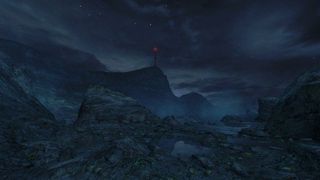
What is Dear Esther, to you? Is it a game? Something else entirely?
I see this as a work of art, as much as I do a game. I'm not a gamer or from that world at all, so I've always seen it as a piece of digital, interactive art. What is interesting to me is that Dan sees it as a game, but neither of us really think you have to make a distinction between game and art. For me, art is about an experience which touches people deeply, and if a game can do that, it's art. I really think and hope that Esther achieves that - it certainly seems to have done.
The music that I've written for Esther is the first time that I've inspired fan mail- every few days I get a lovely email from someone who has had a really strong reaction to the music. As a composer, that means everything to me and it really touches me that people from all over the world take the time to write and express their feelings. I'm very grateful for that and it's utterly thrilling.
Whatever it is, where do you see this "not-game" space at the moment? And where's it heading?
I'm just not into traditional games, as I don't really find them interesting, mainly because of the subject matter. So if games are expanding beyond zombies and chainsaws, that's always going to be a good thing for me! When we won the award at Indiecade, what was fantastic was meeting all these amazing developers, who were doing brilliant, artistic and beautiful things with games, and that was very inspiring. So I'm glad we are part of that.
Most Popular


